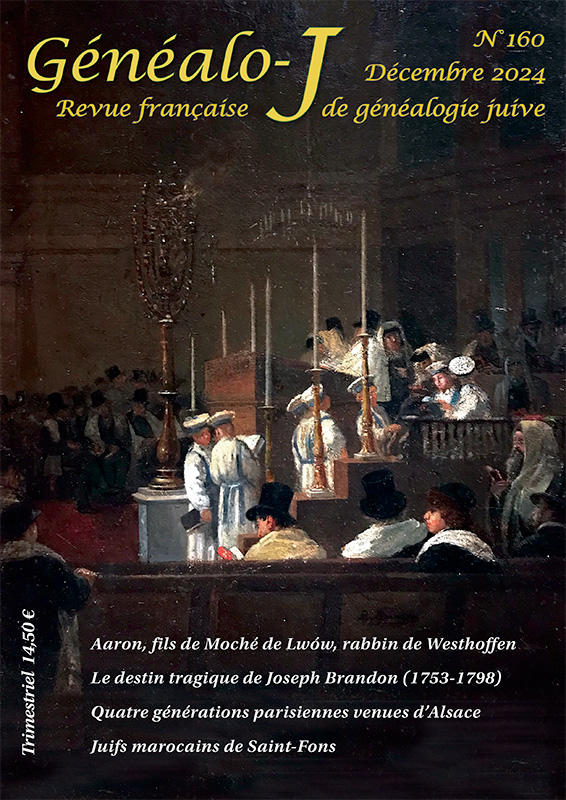
Claude-Alexis Gras
Aaron, son of Moché from Lwów, rabbi of Westhoffen and Hanau County, early 18th century
Initiated after the discovery of a large fragment of Aaron Lwów’s stele in the cemetery of Westhoffen (Bas-Rhin), this investigation aims to sketch out the biography and character traits of this rabbi from Lviv, who officiated in Hanau County in the early 18th century, and whose prestigious descendants include Marcel Proust and Karl Marx. It is based on notarial, tax and judicial archives, as well as on approvals written by Aaron Lwów himself.
Jacques Gerstenkorn
A Portuguese Jew in the revolutionary turmoil : the tragic fate of Joseph Brandon (1753-1798), merchant in Paris
The arrival of Jews from Bayonne in Paris at the end of the Ancien Régime, the dazzling success of a merchant in the Saint-André-des-Arts district, the upheaval of the French Revolution, family and commercial ties with Amsterdam and the trap of emigration that cruelly closes on those who return : it is against this backdrop of exceptional historical density that the tragic story of Joseph Brandon unfolds, a forgotten figure of the first Sephardic Jewish community in Paris which must be highlighted.
Marianne Wolff
Coming from Alsace in the 19th century: four generations of a Parisian Jewish family
Young Jewish men and women from the Bas-Rhin region (Neuwiller, Westhoffen, Wissembourg, etc.) ‘came up’ to Paris in the first half of the 19th century. The men first worked as pedlars, then, generation after generation, they became shop assistants, craftsmen, then engineers or members of liberal professions. They gradually moved away from religion beyond the practices associated with the major acts of life. Marianne Wolff tells the story of the family of Salomon Wolff and Nanette Hirsch-Weil, her great-great-grandfathers, and their descendants.
Raquel Levy-Toledano
The Moroccan Jews of Saint-Fons
After the Great War, some Moroccan Jews settled in Saint-Fons, a working-class housing estate on the outskirts of Lyon. While integrating into their new country, they remained strongly attached to their roots, reproducing in Saint-Fons the life of the mellah. Their quest for a better future was soon overshadowed by the Second World War. While a crooked couple hunted down and handed over more than a hundred members of this community to the Gestapo for a few bucks, others were saved from their macabre fate by a handful of men recognised as “Righteous Among the Nations”. This article looks in detail at the fate and journey of some of the Moroccan Jews in this community who perished or survived Nazi barbarism.